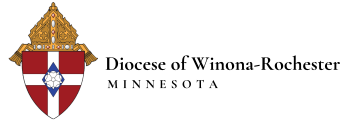- Home
- About
- Bishop Barron
- Offices
- Catholic Cemeteries
- Catholic Charities
- Catholic Foundation
- Catholic Schools
- Chancellor and Archives
- Communications
- Diaconate
- Divine Worship
- Finance
- Hispanic Ministries
- Human Resources
- Lay Formation and RCIA
- Life, Marriage & Family
- Missionary Discipleship
- Pastoral Planning
- Religious Immigration
- Safe Environment
- Social Justice
- SPOF
- The Courier
- Tribunal
- Vicar General
- Vocations
- Young Adult Ministry
- Youth Ministry and Faith Formation
- Directories
Minnesota Catholic Conference highlights Church's role in public square
By Catholic News Agency Staff
St. Paul, Minn
As Minnesota’s legislature prepares to finish its legislative session for the year, the state Catholic conference has noted a recent meeting of the state’s bishops with executive and legislative leaders.
All year, Minnesota Catholic Conference staff help facilitate contacts between individual bishops and legislators, and each spring, all the bishops meet together with state leaders to share their policy concerns. On April 14, Minnesota’s bishops and diocesan administrators met with Gov. Tim Walz, Lt. Gov. Peggy Flanagan and legislative leaders.
The state legislature’s session, which began in January, ended May 17.
The Minnesota Catholic Conference said that the bishops this year “focused on stopping the legalization of assisted suicide by promoting better care for the sick and vulnerable populations, the creation of provisional driver’s licenses for undocumented immigrants, creating more educational options for low-income families, expanding existing nonpublic pupil aid programs, and their opposition to the creation of a recreational marijuana industry.”
“They also highlighted the shared goal of protecting people from COVID-19 while also respecting the ability of people of faith to gather for worship.”
In May 2020, the governor issued an order allowing for the resumption of limited public worship gatherings, days after the bishops of the state said they would allow public Masses to resume in defiance of previous guidelines.
The bishops maintained that the original guidelines were unfairly restrictive toward religious services, as businesses and other entities in the state were slowly being allowed to reopen with safety protocols in place to help guard against the coronavirus.
The state Catholic conference said that the bishops’ conversation with government leaders “are a good lesson in faithful citizenship. The bishops always thank leaders for their willingness to step forward and make significant sacrifices to serve all Minnesotans, and they invite public officials to share their priorities and find areas of common ground upon which they can build the common good.”
The conference described this year’s conversations as constructive, saying that “even when there were points of disagreement, there was civil dialogue and a recognition that these are difficult issues with a myriad of considerations.”
It said that both legislators and laity should remember that “sometimes a specific policy goal of the Church might align more with one party or political program than another. But the Church’s advocacy is principled, not partisan, thereby allowing Catholics to work collaboratively across the political spectrum.”
“More important, the policy advocacy of our bishops is an expression of their pastoral care for all people in the community, especially the poor and vulnerable. After all, they are shepherds of all the souls in their diocese, not just Catholics, and are entrusted to work for their well-being. Advocating for good policies offers a credible witness to the Gospel … Through the work of principled advocacy, Catholics help others come to know the Church as a home for people to know, love and serve the Lord.”
The conference concluded that “to help people know Christ Jesus and obtain their salvation: That is the fundamental ‘why’ behind the Church’s participation in the public square.”

